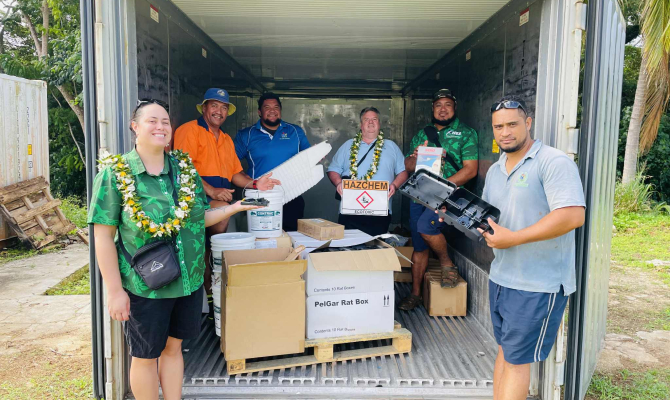
26 June 2025, Atiu, Cook Islands - Atiu Island is taking decisive action to tackle invasive species threatening its ecosystems and community wellbeing, with support from the Secretariat of the Pacific Regional Environment Programme (SPREP) and the Pacific Regional Invasive Species Management Support Service (PRISMSS).
Following a national scoping consultation in 2024, a Letter of Agreement was signed in February 2025 between SPREP and the Cook Islands government, formalising a joint effort to implement the PRISMSS Resilient War on Weeds (WOW) and Resilient Ecosystems, Resilient Communities (RERC) programmes across Rarotonga, Mauke, and Atiu.
On Atiu, invasive species such as the African tulip tree, rats, feral cats, and wild pigs have been identified as priority threats. These species disrupt the island’s fragile environment and pose risks to its water sources, forests, and climate resilience.
“Atiu has a naturally interconnected system of streams and tributaries that supply water across the island,” said Mr. Enua Wichman, National Environment Service Officer. “But wild pigs, through rooting, wallowing, and defecation, are damaging these systems causing erosion, water turbidity, and introducing pathogens that affect both aquatic life and human health.”
Beyond their environmental damage, wild pigs also pose a major threat to local food security. Taro, a culturally and nutritionally important staple crop in Atiu, is frequently uprooted and destroyed by foraging pigs. Their presence in agricultural zones leads to reduced yields and loss of income for families who depend on taro cultivation, compounding the pressures already faced by small island communities under climate stress.
To support local efforts, SPREP has delivered specialised tools and equipment including rat traps, live cage traps, herbicides, and personal protective gear. These are now available in Rarotonga for deployment to the islands.
From 18–20 June, SPREP-PRISMSS technical leads visited Atiu to provide hands-on guidance for setting up predator control systems and using herbicides safely and effectively. The team trained local stakeholders on application techniques, equipment handling, and the appropriate use of herbicides tailored to the African tulip’s growth stages.
The visit began with a welcoming ceremony hosted by the Atiu Island Council. Mayor Timaau Mokoroa expressed his support, stating, “It has been a long time coming for Atiu to get back to managing our priority invasive species. This project has come to the rescue, especially after many of our efforts became dormant in recent years.”
A pig hunting training programme, conducted by the Cook Islands Police Department, ran alongside these efforts to help islanders meet legal requirements and safety standards for feral pig control.
The technical visit also identified the Moko’ero Nui Nature Reserve, established in 2016 on the island’s west coast, as a key site for installing rat and cat traps. Known for its pristine coastal forest and natural tree archway, the reserve represents a vital stronghold for native biodiversity.
“Invasive species are the greatest threat to Pacific biodiversity,” said David Moverley, SPREP Invasive Species Adviser. “Supporting islands like Atiu to regain control of their ecosystems is essential not just for protecting native species, but for building climate resilience, food security, and cultural heritage. This is a truly community-led response, and we’re proud to walk alongside the people of Atiu in this important work.”
Through this initiative, Atiu is reclaiming control of its environment and laying a stronger foundation for climate resilience, with community participation and environmental protection at its heart.
--------------------------------------------------------------------------------------------------------------
About PRISMSS: The Pacific Regional Invasive Species Management Support Service (PRISMSS) is a coordinating mechanism designed to facilitate the scaling up of operational management of invasive species in the Pacific. PRISMSS brings together experts to provide support within the Pacific region with a focus on protection of indigenous biodiversity and ecosystem function. As a service provider, PRISMSS provides a comprehensive suite of support services in a cohesive, effective, efficient, and accessible manner to Pacific Island countries and territories.
Restoring Island Resilience (RIR): The PRISMSS - Restoring Island Resilience (RIR) is a New Zealand-PRISMSS collaboration project that aims to improve Pacific Island Countries and territories livelihoods and resilience to climate change by reducing the impact of invasive species on natural and agricultural ecosystems through the six PRISMSS programmes.
PRISMSS Powered by: New Zealand Foreign Affairs & Trade, UK International Development, GEF, UNEP & SPREP
PRISMSS Partners: Birdlife International, NZ Department of Conservation, Island Conservation, Manaaki Whenua Landcare Research, National Institute of Water and Atmospheric Research, Pacific Community and SPREP
PRISMSS Programmes: Natural Enemies Natural Solutions (NENS), Predator Free Pacific (PFP), Protect Our Islands (POI), Protect Our Marine Areas (POMA), Resilient Ecosystems Resilient Communities (RERC), War On Weeds (WOWs)
For additional information please contact :
Mr Dominic Sadler, PRISMSS Manager on [email protected]
Mr Nitish Narayan, PRISMSS Communications & Liaison Officer on [email protected]